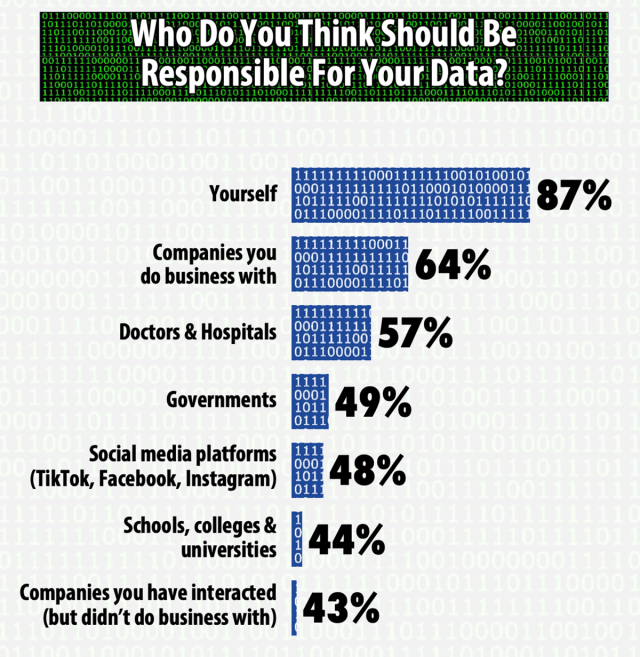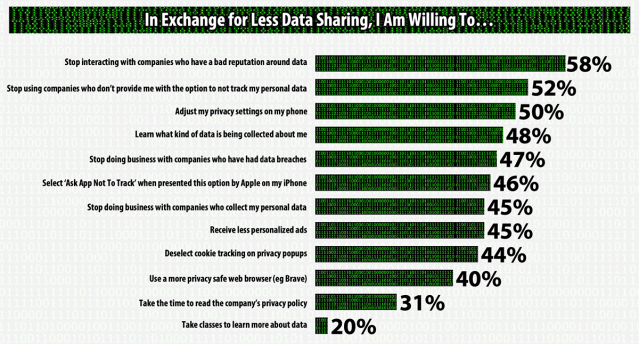
TL;DR
- Evan Shapiro shares the results of a recent PCH Research study assessing American attitudes about data and privacy. The results are a bit surprising (and maybe even depressing).
- The good news is that Americans believe their data is personal and that they should be responsible for maintaining their own privacy. But belief isn’t translating into knowledge or confidence in their choices.
- Businesses need to account for these attitudes and help consumers, not take advantage of them. Americans say they are willing to punish companies that abuse their data-gathering or don’t respect privacy.
“Americans understand way less about how …personal data is collected and used than responsible adult humans should,” Evan Shapiro argues.
He grounds this opinion in a survey of 45,000 Americans (aged 25 and up) that he conducted with Publishers Clearing House, in conjunction with Syracuse University’s Daniela Molta and NYU’s Tiffany Johnson (founder of Xente Data).
Shapiro describes the findings as a “study of Americans’ knowledge, awareness, and understanding of their data privacy and how companies and organizations use the information we volunteer (often unwittingly)” in a recent Substack post.
Unfortunately, Shapiro says, “[T]he answers Americans gave to these questions are both surprising and alarming.” The study concludes, “Americans who are not data savvy are unlikely to see the value in their data and the ways to guard it.”
Some Topline Findings
First, it’s notable that respondents indicated that they considered all of their data to be personal, although they ranked social media, workout behaviors, political information and other readily available information as “less” personal.
Second, Shapiro and co. found “86% of Americans A25+ are concerned about the privacy and security of personal information and data. It ranks just below the current cost of living and just above the state of the economy.”
Interestingly, “[t]he majority of Americans A25+ consider themselves to be private people (82%) who are cautious about security (77%), yet only 51% feel informed about how their personal data is being used by companies, government, and social entities,” according to the PCH study. Yikes.
For example, consumers are not confident about their cookie decisions, despite being confronted with them daily. “Concern for data privacy and security, tied with increased data literacy, will place more pressure on companies to go above and beyond to protect people’s data,” Shapiro predicts.
What This Means for Businesses
Despite evidence of data illiteracy, consumers increasingly believe that they are responsible for their own data; 87% of respondents agreed they should take ownership of their data privacy.

However, “we know the barriers to managing individual data are high, especially for those who don’t have a strong foundation of data and digital knowledge,” Shapiro writes.
Despite the pervasiveness of the data economy, Americans also seem to be less than thrilled about data sharing. In fact, 38% of respondents said they’d prefer to never share their data, while 2% thought they’d trade it in exchange for knowing about new goods or services.
One-third who’d be willing to share their data said they would want to control access, and it was slightly more important than monetary compensation (30%) and ranked significantly above altruism (24%).
But that doesn’t mean respondents don’t value their data. “Consumers view their DNA (50%), Biometric (47%) and Banking (44%) information as the top three most valuable categories of data, believing that data is worth $500+. While these top three categories are considered the most valuable to consumers, they are also the most widely sought after by public and private organizations (think Ancestry, Clear Travel, and every credit card and banking institution).”
And this doesn’t mean Americans expect businesses to eschew corporate responsibility.
If anything, it may indicate a lack of trust and an understanding that a two- or three-pronged (adding in government oversight) approach will be necessary to correct the path we’ve been on for the past three decades. In fact, the study found 64% “believe that both government and businesses should be responsible for data privacy and security.”
Additionally, past behavior shows that consumers will change their behavior if they believe companies have been irresponsibly using their data. Both Meta (formerly Facebook) and Wells Fargo saw significant fallout from privacy and data misuse scandals.
What Can, Will (and Should) Be Done
Shapiro writes, “[S]urvey respondents indicated they are willing to take more action against businesses they don’t trust, leading to a long-term decline for companies who violate consumer trust.”

Also, the study notes, “the change in cookie tracking and targeting will continue to make it difficult for quality advertisers to find their audiences. This signals a need to change their data approach, which opens the door for ‘Permission Marketing’ and gives businesses the chance to redefine how they think of loyal consumers and stops wasting marketing dollars on consumers who have indicated they aren’t interested.”
Shapiro notes that there is a current patchwork of data privacy legislation (and proposed legislation) in the U.S., creating a difficult environment for businesses and consumers alike. The study advocates for federal action to both regulate data collection and to educate consumers about their rights and responsibilities.
Some red flags: About two-thirds of respondents said they were unsure or chose an incorrect answer when asked whether “Companies with ethical standards and data privacy policies do not sell my data” and “I can stop advertisers and marketers from collecting and using my personal data to target ads online to me”. Also, Americans in the 44-65 year-old cohort were more likely to be unsure or incorrect about these answers, indicating that there is an information gap to be filled.
But the good news is that “there is a desire to learn more and do more” to protect consumer data; in fact, “48% of survey respondents agree with the statement ‘I am willing to learn what kind of data is being collected about me’.”


